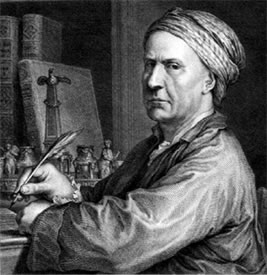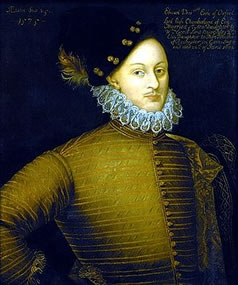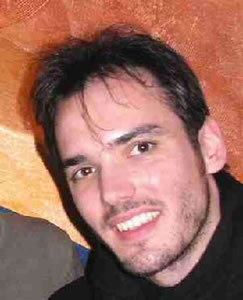De Amerikaanse schrijver en jurist Scott Turow werd geboren op 12 april 1949 in Chicago. Zie ook alle tags voor Scott Turow op dit blog.
Uit: One L
„9/3/75 (Wednesday)
… a warm place, a good place … I think.
They called us “One Ls,” and there were 550 of us who came on the third of September to begin our careers in the law. For the first three days we would have Harvard Law School to ourselves while we underwent a brief orientation and some preliminary instruction. Then, over the weekend, the upper-year students would arrive, and on Monday all classes would officially commence.
A pamphlet sent in August to all first-year students — the One Ls (1Ls) as they are known at HLS — instructed me to be at the Roscoe Pound Classroom and Administration Building at 10:00 A.M. to register and to start orientation. I took the bus into Cambridge from Arlington, the nearby town where my wife and I had found an apartment.
I had been to the law school once earlier in the summer when David, a close friend who’d recently graduated, had given me a tour. HLS occupies fifteen buildings on the northern edge of the Harvard campus, and is bounded on one side by Massachusetts Avenue, Cambridge’s clogged main thoroughfare. The architecture is eclectic. The student commons and dormitories are square and buff-colored and functional. Old Austin Hall, a classroom building, looks like a sooty fortress with arches. Langdell, the school’s largest building, is a long gray expanse of concrete. When I toured the law school in the summer, it had all looked so solid, so enduring, that I’d felt a majestic thrill to think I’d soon be allied with this and the time-ennobled traditions of the law. Now, getting off the bus, I felt mostly my nerves, which were lit all the way down to my knees.
In the Pound Building, a modern affair with exposed brick walls and a lot of glass, I was handed a thick packet of registration materials as soon as I came through the door. Then I was directed down the hall to a classroom where my section — Section 2 — was being loosely assembled for the first time to fill out the variety of cards and forms in the packets.”
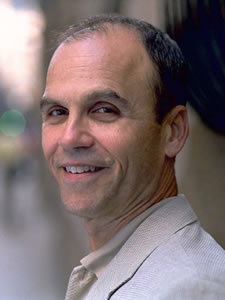
Scott Turow (Chicago, 12 april 1949)
De Amerikaanse schrijver Tom Clancy werd geboren op 12 april 1947 in Baltimore County, Maryland. Zie ook alle tags voor Tom Clancy op dit blog.
Uit: The Bear and The Dragon
„Going to work was the same everywhere, and the changeover from Marxism-Leninism to Chaos-Capitalism hadn’t changed matters much — well, maybe things were now a little worse. Moscow, a city of wide streets, was harder to drive in now that nearly anyone could have a car, and the center lane down the wide boulevards was no longer tended by militiamen for the Politburo and used by Central Committee men who considered it a personal right of way, like Czarist princes in their troika sleds. Now it was a left-turn lane for anyone with a Zil or other private car. In the case of Sergey Nikolay’ch Golovko, the car was a white Mercedes 600, the big one with the S-class body and twelve cylinders of German power under the hood. There weren’t many of them in Moscow, and truly his was an extravagance that ought to have embarrassed him…but didn’t. Maybe there were no more nomenklatura in this city, but rank did have its privileges, and he was chairman of the SVR. His apartment was also large, on the top floor of a high-rise building on Kutusovskiy Prospekt, a structure relatively new and well-made, down to the German appliances which were a long-standing luxury accorded senior government officials.”

Tom Clancy (Baltimore County, 12 april 1947)
De Britse blijspelauteur Alan Ayckbourn werd geboren op 12 april 1939 in Londen. Zie ook alle tags voor Alan Ayckbourn op dit blog.
Uit: Welcome To Winnie’s World
„I have been told over the years that I write well for women. If indeed I do – and since often it is women themselves who tell me so who, am I to deny it? – I am gratified. When pressed to explain precisely why this should be – am I, for instance in the habit of listening at keyholes or lurking unobserved behind powder room doors – I tend to explain it away with the fact that during the most formative years of my early childhood I was what they termed an “only” who spent a lot of the time in the company of adults. More significantly, after the early departure of my father in search of new sexual pastures, I was also the product of a single parent family, thus spending long hours in the company of my mother who, particularly after a glass of sherry, expressed her views emotionally and vociferously, on men in general and woman’s lot in particular. From an early age I was imbued with a strong pro female bias. To compound this, my mother also had a large circle of similar post-war career women who shared similar views to her own.
And so, from the age of four years onward, I sat in the corners of rooms, offices or on occasion hairdressers swinging my knobbly-kneed, matchstick legs protruding from my oversized short trousers, there at the feminine front line a tiny invisible war correspondent, silent and inwardly digesting.”
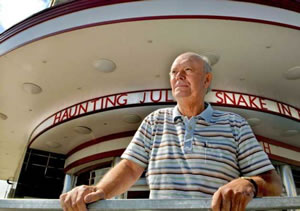
Alan Ayckbourn (Londen, 12 april 1939)
De Duitse schrijfster Antje Rávic Strubel werd geboren op 12 april 1974 in Potsdam. Zie ook alle tags voor Antje Rávic Strubel op dit blog.
Uit: Kältere Schichten der Luft
„Sie lebten wurzellos. Zeitenthoben. Sie waren in eine unbekannte Gegend gekommen, in ein anderes Land, in eine fremde Region, in der sie nur das waren, was sie den Sommer über hier jeden Tag machten; sie waren Kanu-Scouts, sie bauten Tipis, sammelten Beeren, sie brieten Lachse und schwammen im See. Für sie war es, als schlösse sich das jetzige Leben ihrem früheren nicht mehr an, ein paar Blessuren und abstrakte Betrachtungen ausgenommen. Retrokacke, wie jemand am Lagerfeuer sagte.
Es gab wenig Abwechslung. Jedes Gerücht bauschten sie auf. Und wenn die Gerüchte zu versiegen schienen, dachten sie sich neue aus, oder sie reicherten die alten mit neuen Fakten an, und es war unmöglich herauszufi nden, was an diesem Gerede stimmte. Sie hatten sich daran gewöhnt.
Niemand störte es, wenn Svenja, die Campchefi n, über Ralf lästerte. Als er sich einen Jagdschein ausstellen ließ, sagte sie, sie sei sicher, er hätte in seinem Leben auch schon Menschen vor der Knarre gehabt. Man fragte sich allerdings hinter vorgehaltener Hand, wie Ralf da mit einer wie Svenja überhaupt klarkommt.
Sie lebten wurzellos, sie versuchten, das Beste daraus zu machen.“
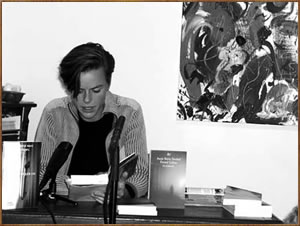
Antje Rávic Strubel (Potsdam, 12 april 1974)
De Duitse schrijfster Agnes Sapper werd geboren op 12 april 1852 in München. Zie ook alle tags voor Agnes Sapper op dit blog.
Uit: Ein Wunderkind
„Wunderkinder gibt es aller Art. Solche, die wie Mozart mit drei Jahren Klavier spielen, andere, die im gleichen Alter mehrere Sprachen lesen können.
Von einem Wunderkind ganz eigener Art möchte ich erzählen. Mein Wunderkind heißt Fridolin und ist das älteste Kind von armen Arbeitersleuten. Es war sechs Jahre alt geworden, ohne daß jemand ahnte, was für ein besonderes Geschick in dem Kleinen steckte, bis eines Tages der Vater zu ihm sagte: »Fridolin, nimm meinen Sonntagsrock und trag ihn zum Schneider, daß er den Riß am Ärmel flicke.«
Fridolin trug den Rock zum Schneider und dieser versprach, den Schaden wieder gut zu machen.
»Ich will darauf warten,« sagte Fridolin.
»So schnell geht’s nicht,« entgegnete der Schneidermeister, »ich habe vorher noch etwas anderes zu nähen.«
»Ich kann ja warten,« wiederholte das kleine Bürschlein.
»Da dürftest du lange warten,« meinte der Schneider, »geh du nur wieder heim.«
»Ich kann auch lang warten,« versetzte der Kleine und rührte sich nicht von der Stelle. Zwei junge Burschen, ein Geselle und ein Lehrling, die auch an der Arbeit saßen, lachten über den Kleinen, der sich nicht vertreiben ließ: da lachte der Schneider auch,
legte den Rock beiseite, setzte sich an die Arbeit und sagte zu seinem Gesellen: »Laß den Knirps nur stehen, er wird schon bald genug kriegen.«
Aber Fridolin bekam nicht genug. Er stand hinter dem Gesellen und sah ihm aufmerksam zu, wie er Knopflöcher nähte. Acht Uhr war es gewesen, wie er gekommen war, und um zehn Uhr stand er noch da.“

Agnes Sapper (12 april 1852 – 19 maart 1929)
Zie voor nog meer schrijvers van de 12e april ook mijn vorige blog van vandaag.



